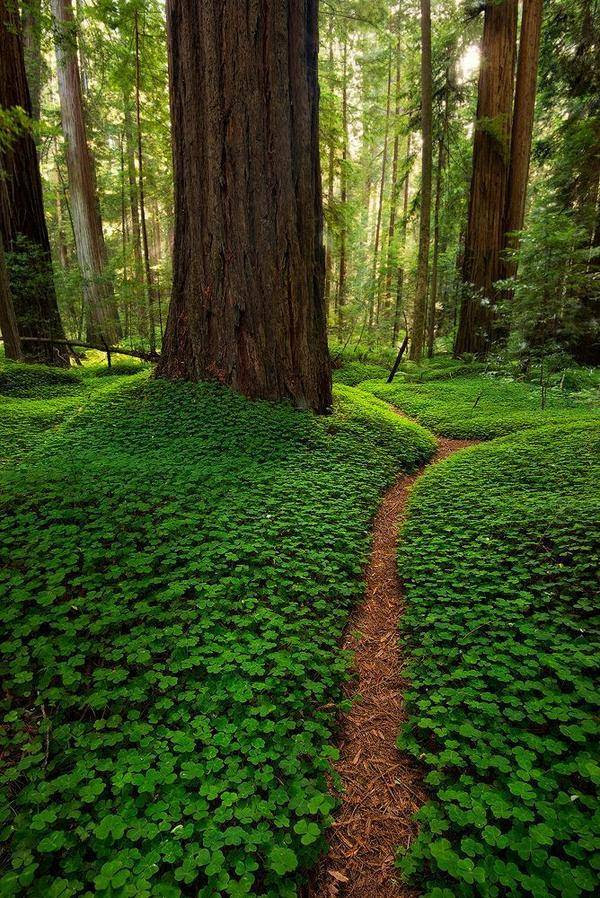
In May 2015 I was asked to take a group of Spanish students to visit the redwood forest in Anderson Grove near Healdsburg, California. The students were sophomores from the University of Navarra in Pamplona, Spain. Most of them had not previously visited the United States and none had been in a redwood forest. They were typical of the 18- and 19-year-old students whom I had taught at Berkeley.
When we arrived at the parking lots at Anderson Grove they piled out of the vans and clustered in small groups intently engaging in conversation. Some who were not engaged in conversation were texting on their cell phones or taking picture. I lined the students up in single file and walked them passed the entrance kiosk and into the forest. We walked about 100 yards accompanied by a cacophony of their conversation. Many of the students were also texting and taking pictures. Stopping the group, I told them I wanted them to experience the forest on a basic level and that I thought their conversation, texting, and photography would interfere with that level of experience. Then I asked them to turn their cell phones off and give them to me. Some students seemed very reluctant to give up their cell phones. They looked pained by my request. Having obtained their cell phones, I asked them to walk alone through the forest to an opening about ¼ mile further along the trail. I asked them to stay 50 feet apart and not engage in any conversation with other students. This was to insure that they would have a more or less individual experience of walking through the redwoods.
The students walked individually through the beautiful grove of ancient trees. When we all assembled in the small clearing at the end of the walk, I gave each student a piece of paper and asked them to write a list of words to describe how they felt while walking through the redwoods. After 5 minutes each student read the words he or she had written down. These included the following words, some of which appeared on several of the student’s lists: “peaceful”, “calm”, “reverent”, “sublime”, “relaxed”, “comfortable”, “happy”. I too had experienced many of these feeling walking alone through redwood forests. The silence and majesty of the trees always melted away the anxiety and trivia that cluttered my mind. Any sense of my problems seemed insignificant in the presence of the age-old, giant trees. Being among them made me feel at peace with myself, the world and happy.
I returned the student’s cell phones and invited them to walk back to our vans in the parking lot. The cacophony of conversations, texting, and photographing returned as we walked back. But I was glad they had experienced a special level of happiness in the redwood forest.
________________________________________________________

SPECIALIZATIONS Vegetation and ecological analysis; urban forestry; historic landscape restoration.
BIOGRAPHY: Professor McBride’s current research involves projects on (1) the effects of urban forests in the reduction of air pollution in China, (2) the composition, structure, and function of urban forests in different biomes, (3) the role of fire in riparian woodlands of the Sierra Nevada, and (4) wind patterns, micro-climates, and windthrown hazard in urban areas.
AWARDS + RECOGNITION: Merit Award for Stanford University Vegetation Management Plan. ASLA. 1983 Resources Preservation Award for San Francisco Presidio Study. National Resources Council. 1987Distinguished Teaching Award. University of California. 1991Carl Alwin Schenck Award for Distinguished Teaching. Society of American Foresters. 1992Honor Award for Sutro Baths Historic Restoration Plan. ASLA. 1993Donald P. Gasser Award for Distinguished Contributions to Forestry Education. University of California. 1997 and 2007Fellow Society of American Foresters. 1997Seal of the College of Natural Resources. University of Tehran. 1999Research Award International Society of Arboriculture – 2003 Elected Member of the Chinese Academy of Forestry – 2004Keynote Speaker – Annual Meeting of the International Society for Arboriculture. Honolulu, Hawaii. July 2007Outstanding Field Course Teaching Award, College of Natural Resources, University of California, 2008Keynote Speaker – Ohio Conference on Urban and Community Forestry. Ohio State University. Columbus, Ohio. October 2009The Outstanding Educator Award. Council of Educators in Landscape Architecture, 2009The California Preservation Foundation Award for “Restoration of the Gardens on Alcatraz Island” – 2009Keynote Speaker – International Conference on Urban Forestry in Challenging Environment. Beijing Forestry University. Beijing, P.R.C., September, 2010Best in Practice Award, Northern California APA – San Francisco Better Streets Plan, 2010Charter Award, Congress for New Urbanism – San Francisco Better Streets Plan, 2011AWARDS + RECOGNITION
JOE’S PHILOSOPHY & MANY PUBLICATIONS CAN BE GOOGLED
________________________________________________________
BILLY’s COMMENTS: In July 1997, Prof McBride and Dean Harrison Fraker led a team of five members from UC Berkeley’s College of Environmental Design on a five day visit to Ningbo, China – Billy’s ancestral home. They consulted with the Ningbo City Government on how to develop a model urban design plan for simultaneous achievement in both economic development and environmental protection strategies . Prof Joe McBride and Dean Fraker led the Berkeley Team. A year later The 1990 Institute, UC Berkeley, and Ningbo City jointly submitted a proposal to ADB ( Asia Development Bank ) via China’s Central Planning Office. Although the master proposal, which focused on priorities in development sequences, was rejected due to ADB’s switch in policy in funding only actual construction projects instead of planning studies. Prof. McBride obtained a separate grant to do a Urban Forest Study for Ningbo. Poeple generally all respect Joe and appreciate his firm and thoughtful caringness. He is forever a DEAR FRIEND if not your BEST FRIEND.
__________________________________________________________